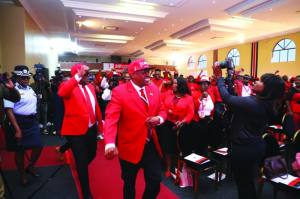Close to the city, and with a close cousin, for decades having an iron grip over this place as its sole ruling party MP, his birthplace was a possessing place. This made it an ideal home for him to grow in life and in social activism.
Success at social activism ordinarily requires either charismatic characters, or at least, individuals who appeared quixotic in their time but come to seem prescient in ours. He fell in the latter category. Although he was for some time one of them, he was almost by nature, critical of most politicians, even though he must, at one point, have harboured a desire to be at the centre of politics. This dialectical relationship with his ilk meant that he was always doomed to wander around politics, not as one of its chief actors, but on its periphery, high as a plastic kite of his youth.
In toying, and ultimately succeeding with insisting on opposition party cooperation, he must have accepted that his own party’s sole search for political power was a quest without end. He must have also reasoned that, as they were, opposition politics were fragmented, socially ambiguous and consequently disenchanting to many voters. Nonetheless, his success in local government politics, in the trade union movement, in opposition politics and now in an executive appointment as one of the leaders of a Presidential Commission on Constitutional Review, underscores the perennial hope of ordinary people accomplishing extraordinary feats; the adventurousness of party politics; and the progression of a focused citizen, despite everything. Against the wish by many of us for national relevance at all times, followed by the grudging acceptance that our pedigree or advanced age often seem to confirm that we will fail at this, what one sees in his recent appointment is the valour of this unlikely knight, able to catch the attention of powerful people, and succeeding, again against odds, to keep personal oblivion at bay. In what may arguably be his life’s final public act, he is now serving this nation in a nonpartisan capacity and assuming direct accountability to the President – arguably, the yearning of every activist!
Johnson Pikiniki Motshwarakgole was born in Molepolole in 1954. Although he was born into peasantry, he was blessed with untapped brains and a rare capacity to wrestle with and grasp tightly the workings of power, influence and perfect timing. He cared deeply about social justice and thought communism, that pernicious ideology, might be a solution to humanity’s problems. Assuming a swashbuckling persona and desiring prominence, in public he would wear the Mao Zedong cap as a symbol of his affinity for communism and self-referential identity.
Because of that, or despite it, he rose from a working class background in a commuter village to become the most visible, vocal and authoritative voice of the trade movement everywhere in Botswana. With no formal education to talk about, redolent of the times he was born in, he must have regarded that omission as a mere nuisance, capable of being overcome with sufficient resilience, planning and street wizardry. And as a driver by profession, later a town councillor, and then an influential and long serving social activist, there is no doubt that he has been on the road of ambition countless times.
Every aspect of his activist life seems primed to exploit the light of the present. The warnings he gave certain MPs that organised labour will work to oust them from their positions gave a new lustre to his immense power within the labour movement. So too, did his spontaneous criticism of intra-party conflict within his own opposition political party, and in an industry that is prone to encourage the culture of braggadocio and self-promotion, he was anything but that. With his humble and challenging beginnings that I believe he never really forgot or took for granted, he was uniquely matched to activism. I am thus inclined to reckon that ultimately his life was a perfect conjunction of the activist with the cause.
Like a true human being, he had countless flaws. These included his stranglehold on leading the trade union movement, his presumptuousness of the collective vote of organized labour, him continuing to work during the country-wide civil service strike of 2011, and allegedly getting a golden handshake of millions of Pula for his long service to trade unionism at a time of financial pain for the unions’ rank and file whom he spent his life fighting for. But these flaws looked like slight indiscretions when compared to those of some politicians or even of other activists who were less principled or less hardworking than him. And there is no doubt that he was shrewder and tenacious for the causes he believed in. Indeed, he was an instinctive pugilist, and if knocked down, figuratively, he always got up, wiped his sweat off his brow, spit his blood and fought back until he knocked out his opponent (including for a competitive office), or at least scored some victory for himself or activism.
Ultimately, we ought to take a moment to reflect on and admire one of us, for leading a remarkable life, just by mere will, determination and common sense, despite the adversity around him. Additionally, his life and achievements should be seen as emblematic of what any person, with no education, no name recognition, no wealth, and no connections, but armed with a true desire, and in a nation that allows ambition and opportunity to flourish, can amount to. In fact, as we work toward being a prosperous country yonder there, every generation of this Republic must be willing to fling open its doors and windows of encouragement to welcome any citizen with grit, notwithstanding the circumstances of their birth or life. In my view this Republic’s duty to others is not just a code for inclusivity, or the stuff of social activism: it is every bit as important as the Republic itself.
*Radipati is a regular Mmegi contributor







